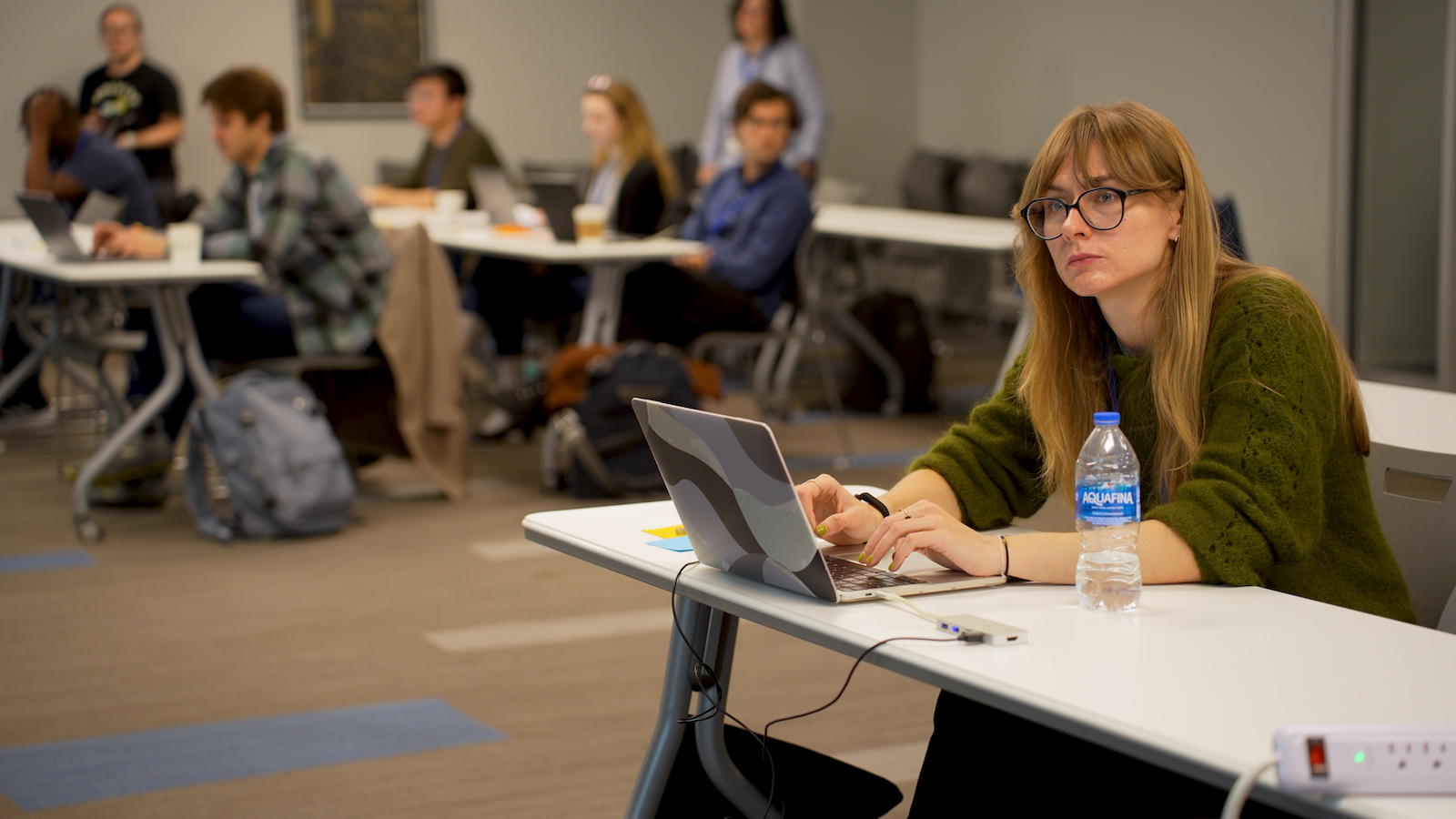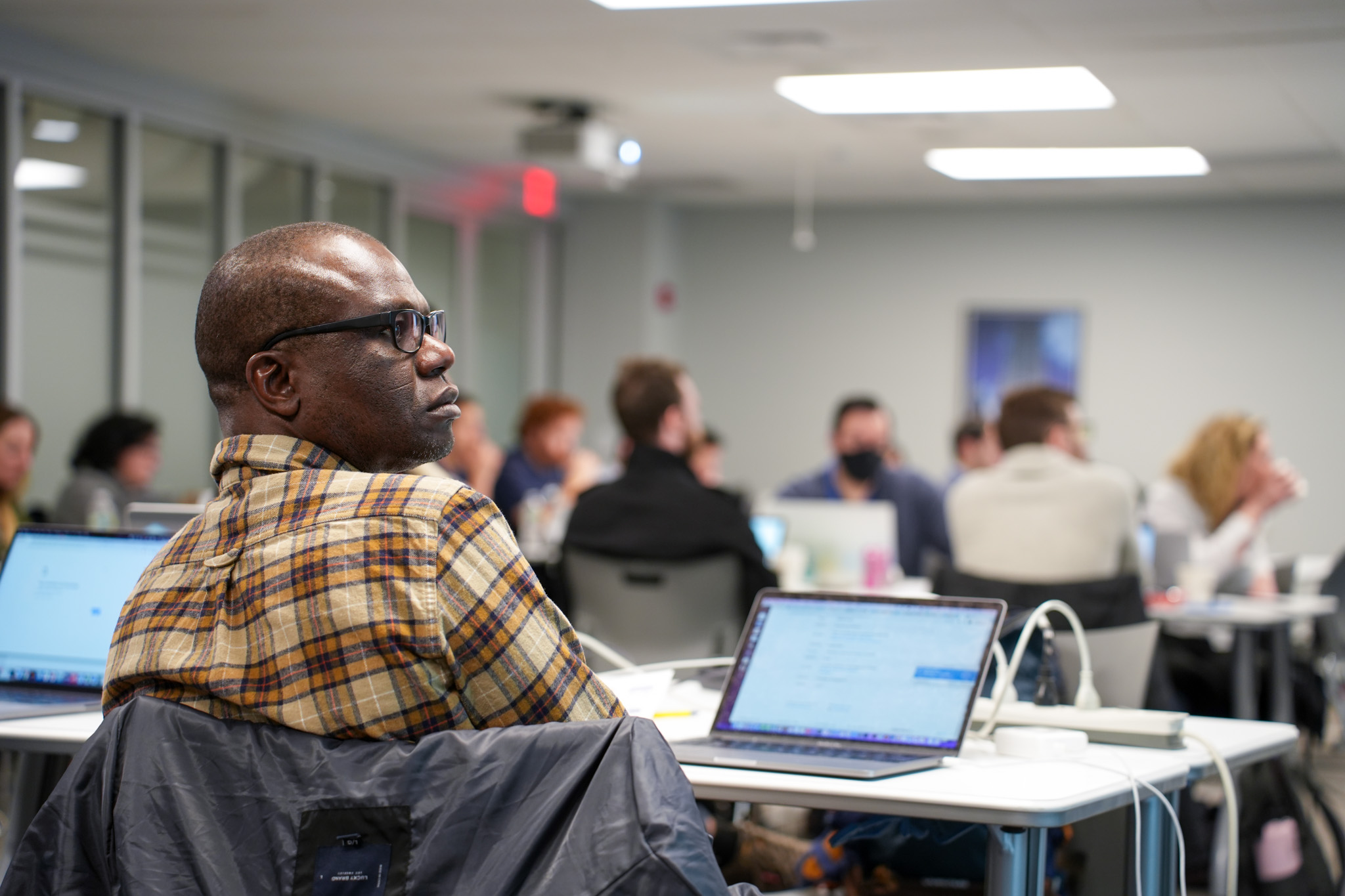Pediatric Cancer Researchers Driving Progress Through Data, Training, and Collaboration
At the Childhood Cancer Data Lab, we support pediatric cancer researchers by providing data science training, collaborating on data-intensive projects, and designing open-source tools. Through this work, we’ve had the opportunity to engage with scientists who are applying rigorous, data-driven approaches to address some of the most pressing challenges in childhood cancer.
September is Childhood Cancer Awareness Month, a time to recognize the urgent need for better treatments and outcomes for children with cancer. We’re highlighting a few researchers who have drawn on the Data Lab’s resources and expertise in their remarkable efforts to accelerate discovery and improve outcomes for children with cancer.
Meet the Researchers!

Senior Postdoctoral Fellow
St. Anna Children’s Cancer Research Institute (CCRI)
Dr. Maud Plaschka from the Halbritter group at CCRI is a computational biologist studying Wilms tumor, the most common form of kidney cancer in children. We first connected with Dr. Plaschka in 2021, during a pivotal moment in her career: transitioning from bench research to the world of bioinformatics. Eager to develop computational skills that could deepen her understanding of omics approaches and their potential to improve standard-of-care therapies, she enrolled in our Introduction to Single-Cell RNA-Sequencing workshop.
“This workshop allowed me to move smoothly and confidently to computational science with a first set of solid analysis skills,” she reflects. “I often refer to the resources made available by the Data Lab to help computational biologists perform their analyses according to best practices for reproducible research.”
Today, Dr. Plaschka’s expertise in omics analysis is highly sought after by her collaborators. In addition to her work on Wilms tumor, she has contributed her bioinformatics expertise to several recent high-impact studies, including collaborative efforts published in Nature Cancer, Frontiers in Immunology, and the Journal of Experimental Medicine.
Dr. Plaschka is also a frequent user of the Data Lab’s Single-cell Pediatric Cancer Atlas (ScPCA) Portal and a contributor to our OpenScPCA project. “Every pediatric cancer is a rare disease entity, which makes it difficult to study in a comprehensive manner. The only way to go is collaboration and extensive sharing of data and expertise,” Dr. Plaschka notes. As a key contributor to OpenScPCA, Dr. Plaschka has lent her expertise to help build a robust, open-access data resource that empowers pediatric cancer researchers around the world.

Postdoctoral Fellow
Children's Hospital Los Angeles
Dr. Elena Vasileva is working to uncover how Ewing sarcoma, a rare and aggressive childhood cancer, originates and develops. One of the major challenges in this area of research has been the lack of reliable models to study the early stages of the disease. To address this, Dr. Vasileva developed a novel zebrafish model of Ewing sarcoma, enabling researchers to observe the behavior of cancer cells and track progression over time.
Her work, supported in part by an Alex’s Lemonade Stand Foundation Young Investigator grant, led to the discovery that a cancer-causing gene known as EWSR1-FLI1 can “reprogram” early embryonic cells. This shift appears to be one of the first steps in the development of Ewing sarcoma. To understand this process more deeply, Dr. Vasileva applied single-cell analysis to see how tumors initiate.
In December 2024, she joined the Data Lab’s Advanced Single-Cell RNA-Sequencing workshop to strengthen the skills needed for the next phase of this project. This was her second time training with the Data Lab after previously attending our Reproducible Research Practices course, where she improved how she documents and shares her code and analyses.
Through her continued training and innovative research, Dr. Vasileva is laying the groundwork for new insights into Ewing sarcoma.

Bioinformatics Scientist
Department of Biomedical and Health Informatics (DBHi)
Children’s Hospital of Philadelphia (CHOP)
Dr. Eric Wafula is a bioinformatician who advances pediatric cancer research by developing data analysis methods and contributing to open, collaborative projects. When he joined CHOP, Dr. Wafula was transitioning from a background in plant biology to cancer genomics, a change that required him to quickly get up to speed with new tools, techniques, and a completely different disease context.
Although he had experience in informatics, childhood cancer was a new research area for him, and he had limited exposure to programming tools like R and the Tidyverse. Dr. Wafula learned about the Data Lab’s Introduction to Single-Cell RNA-Sequencing workshop, a course that starts with basic R programming. He describes the workshop experience as a “guiding light” during his earliest pediatric cancer research days and has since attended nearly every course we offer including Advanced Single-cell RNA-Sequencing and Reproducible Research Practices.
Dr. Wafula is a key contributor to several open, collaborative projects that are transforming the landscape of pediatric brain tumor research. He has played an integral role in initiatives like the Open Pediatric Brain Tumor Atlas (OpenPBTA) and the ongoing Open Pediatric Cancer (OpenPedCan) project, both of which exemplify the principles of open science by making data and code freely available to the community.
Researchers like Dr. Wafula, who are committed to continuous learning, fostering collaboration, and broadening access to data, are driving meaningful progress in pediatric cancer research.
Hear more from Drs. Vasileva and Wafula in this interview about Data Lab training workshops!
Working Together for Kids With Cancer
If you're a pediatric cancer researcher, we hope to connect with you. Explore our workshops, projects and tools, and learn how to collaborate with us. Let’s work together to accelerate discoveries that will change the future for children fighting cancer!
Upcoming workshops:
- Reproducible Research Practices - November 6-7, 2025, Philadelphia
- Advanced Single-cell RNA-Sequencing - December 8-12, 2025, Virtual
At the Childhood Cancer Data Lab, we support pediatric cancer researchers by providing data science training, collaborating on data-intensive projects, and designing open-source tools. Through this work, we’ve had the opportunity to engage with scientists who are applying rigorous, data-driven approaches to address some of the most pressing challenges in childhood cancer.
September is Childhood Cancer Awareness Month, a time to recognize the urgent need for better treatments and outcomes for children with cancer. We’re highlighting a few researchers who have drawn on the Data Lab’s resources and expertise in their remarkable efforts to accelerate discovery and improve outcomes for children with cancer.
Meet the Researchers!

Senior Postdoctoral Fellow
St. Anna Children’s Cancer Research Institute (CCRI)
Dr. Maud Plaschka from the Halbritter group at CCRI is a computational biologist studying Wilms tumor, the most common form of kidney cancer in children. We first connected with Dr. Plaschka in 2021, during a pivotal moment in her career: transitioning from bench research to the world of bioinformatics. Eager to develop computational skills that could deepen her understanding of omics approaches and their potential to improve standard-of-care therapies, she enrolled in our Introduction to Single-Cell RNA-Sequencing workshop.
“This workshop allowed me to move smoothly and confidently to computational science with a first set of solid analysis skills,” she reflects. “I often refer to the resources made available by the Data Lab to help computational biologists perform their analyses according to best practices for reproducible research.”
Today, Dr. Plaschka’s expertise in omics analysis is highly sought after by her collaborators. In addition to her work on Wilms tumor, she has contributed her bioinformatics expertise to several recent high-impact studies, including collaborative efforts published in Nature Cancer, Frontiers in Immunology, and the Journal of Experimental Medicine.
Dr. Plaschka is also a frequent user of the Data Lab’s Single-cell Pediatric Cancer Atlas (ScPCA) Portal and a contributor to our OpenScPCA project. “Every pediatric cancer is a rare disease entity, which makes it difficult to study in a comprehensive manner. The only way to go is collaboration and extensive sharing of data and expertise,” Dr. Plaschka notes. As a key contributor to OpenScPCA, Dr. Plaschka has lent her expertise to help build a robust, open-access data resource that empowers pediatric cancer researchers around the world.

Postdoctoral Fellow
Children's Hospital Los Angeles
Dr. Elena Vasileva is working to uncover how Ewing sarcoma, a rare and aggressive childhood cancer, originates and develops. One of the major challenges in this area of research has been the lack of reliable models to study the early stages of the disease. To address this, Dr. Vasileva developed a novel zebrafish model of Ewing sarcoma, enabling researchers to observe the behavior of cancer cells and track progression over time.
Her work, supported in part by an Alex’s Lemonade Stand Foundation Young Investigator grant, led to the discovery that a cancer-causing gene known as EWSR1-FLI1 can “reprogram” early embryonic cells. This shift appears to be one of the first steps in the development of Ewing sarcoma. To understand this process more deeply, Dr. Vasileva applied single-cell analysis to see how tumors initiate.
In December 2024, she joined the Data Lab’s Advanced Single-Cell RNA-Sequencing workshop to strengthen the skills needed for the next phase of this project. This was her second time training with the Data Lab after previously attending our Reproducible Research Practices course, where she improved how she documents and shares her code and analyses.
Through her continued training and innovative research, Dr. Vasileva is laying the groundwork for new insights into Ewing sarcoma.

Bioinformatics Scientist
Department of Biomedical and Health Informatics (DBHi)
Children’s Hospital of Philadelphia (CHOP)
Dr. Eric Wafula is a bioinformatician who advances pediatric cancer research by developing data analysis methods and contributing to open, collaborative projects. When he joined CHOP, Dr. Wafula was transitioning from a background in plant biology to cancer genomics, a change that required him to quickly get up to speed with new tools, techniques, and a completely different disease context.
Although he had experience in informatics, childhood cancer was a new research area for him, and he had limited exposure to programming tools like R and the Tidyverse. Dr. Wafula learned about the Data Lab’s Introduction to Single-Cell RNA-Sequencing workshop, a course that starts with basic R programming. He describes the workshop experience as a “guiding light” during his earliest pediatric cancer research days and has since attended nearly every course we offer including Advanced Single-cell RNA-Sequencing and Reproducible Research Practices.
Dr. Wafula is a key contributor to several open, collaborative projects that are transforming the landscape of pediatric brain tumor research. He has played an integral role in initiatives like the Open Pediatric Brain Tumor Atlas (OpenPBTA) and the ongoing Open Pediatric Cancer (OpenPedCan) project, both of which exemplify the principles of open science by making data and code freely available to the community.
Researchers like Dr. Wafula, who are committed to continuous learning, fostering collaboration, and broadening access to data, are driving meaningful progress in pediatric cancer research.
Hear more from Drs. Vasileva and Wafula in this interview about Data Lab training workshops!
Working Together for Kids With Cancer
If you're a pediatric cancer researcher, we hope to connect with you. Explore our workshops, projects and tools, and learn how to collaborate with us. Let’s work together to accelerate discoveries that will change the future for children fighting cancer!
Upcoming workshops:
- Reproducible Research Practices - November 6-7, 2025, Philadelphia
- Advanced Single-cell RNA-Sequencing - December 8-12, 2025, Virtual

